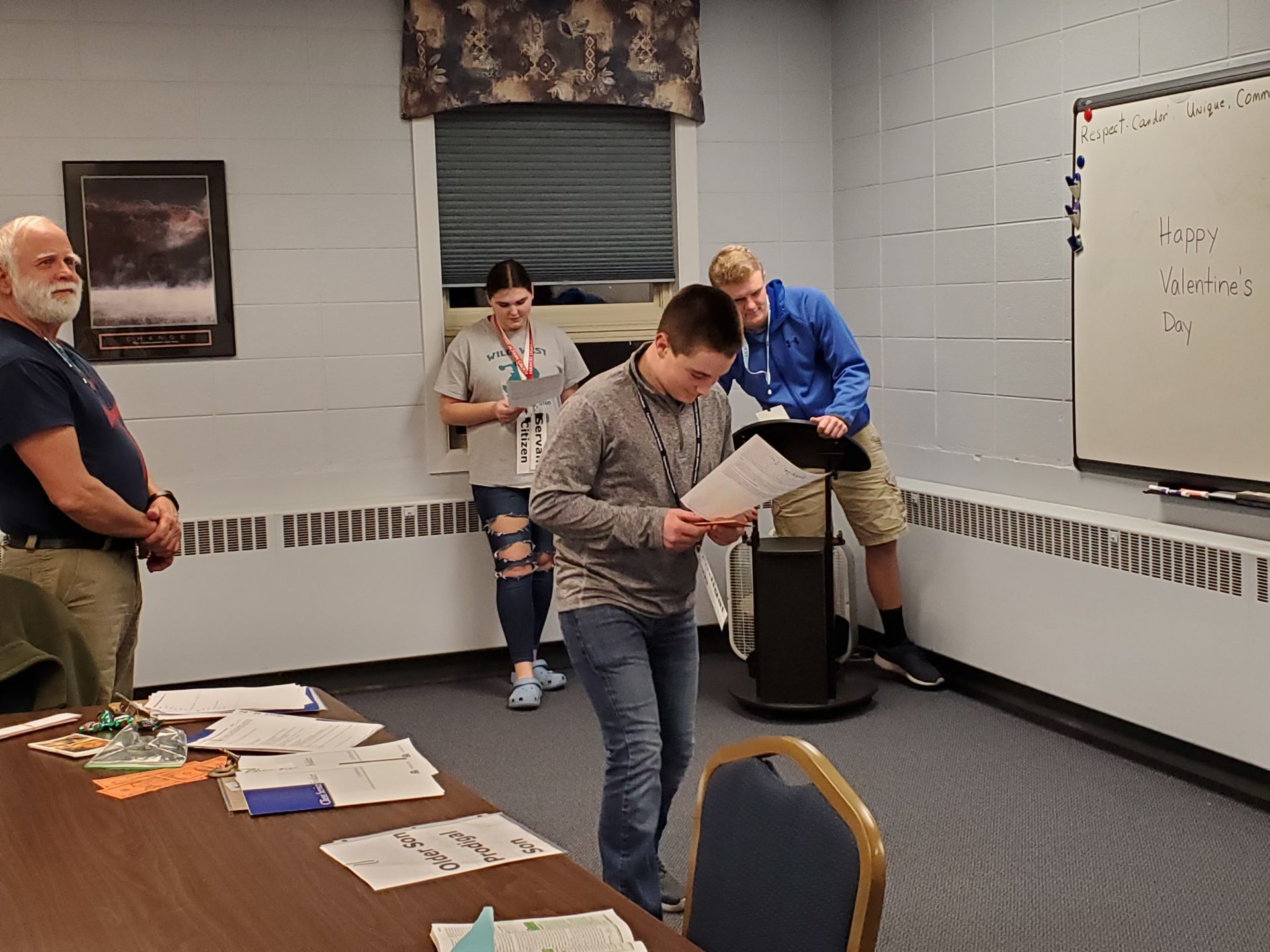KAREN MAHONEY
SPECIAL TO THE CATHOLIC HERALD
The challenge in teaching religious education classes to teens is often a daunting task; but during a quarantine, it is especially difficult to ensure lessons are understood when students and catechists are unable to meet face-to-face.

Jeff Kraschnewski watches as his teenaged religious education students act out a scene in the Beatitudes. (Submitted photo)
Despite the social distancing drawbacks, Jeff Kraschnewski, brought out his creative side to ensure the students grasped his lesson. The Burlington resident is a member, catechist and coordinator of the Joy Ministry at the four-parish cluster of St. Francis Xavier, Kansasville; St. John the Baptist, Union Grove; St. Mary of the Assumption, Kansasville; and St. Robert Bellarmine, Union Grove.
Utilizing the study of the Beatitudes, Matt 5:2-12, Kraschnewski tasked his high school students with creating their own version, especially appropriated for this time of pandemic.
“The educational dialog with the Young Christian (YC) students was a tad daunting, as I couldn’t read their faces to ensure their understanding or engagement,” he said. “We were blessed with responsible students who replied in a timely fashion, and in some cases, in-tune parents who provided the responsibility to help their teens do their part. Good record-keeping was necessary to document who replied and in what capacity, and who hadn’t. Another challenge was that I was not able to directly demonstrate the joy of the Faith and of the Bible to the YC as can be done in a conventional classroom setting.”
Kraschnewski said he has always appreciated the Beatitudes for their beauty in text and their example of reward for virtuous action and relief for the suffering.
“As a religious educator, I view part of my job is in bringing God’s words alive to the YC, and for them to see how the Bible impacts their lives of today,” he said. “Having them get a feel for what Jesus said, and then applying the thoughts to their world does all of this. For me, the Beatitudes study and authorship is a beautiful study topic.”
Most of Kraschnewski’s seven students, whom he jokingly refers to in this study as “The Beatituders” did their own writing, but some worked with assistance from a parent.
“I am pleased with both scenarios, as ninth graders may need some direct adult promptings when it comes to faith-based education,” he said, adding, “That’s why the Good Lord made CCD instructors.”
Most students wrote between one and five modern Beatitudes with one student writing 15. He received a special congratulatory email from his pastor, Fr. Russ Arnett.
Some of the 36 Young Christian Beatitudes are:
Blessed are the intelligent, for they will further the world;
Blessed are the healthcare workers, for they shall receive the best cure;
Blessed are the sick, for they shall be healed of their sickness;
Blessed are the hungry, for they shall have a feast of their lives;
Blessed are the families who are finding more time together, for they will be building bonds for a lifetime;
Blessed are the students who work through online learning, for they will so appreciate being back in the classroom;
Blessed are those that care for their pigs, for they will have plenty of food;
Blessed are the home-schooled, for they shall always find their way to class.
While students did not say, Kraschnewski said he believed students enjoyed the project, as they realized a 64-percent success rate during a pandemic, when there was no structured school, nor normal socializing time with friends and during an uncomfortable time in their young lives.
They were faith-motivated to participate, and they had a chance to speak in a manner like their Savior.
“We normally receive compliments from engaged parents thanking us for our efforts,” he said. “It is important to remember, that these same teens were also participating in online high school classes as well, so our teaching was also one more burden on their pandemic-quarantine, messy plate.”
Remote religious education instruction is not as fun as meeting in person, Kraschnewski said, as he spends a lot of time emailing lessons, keeping records and responding to emails from students.
“During a normal, non-quarantine class period, we have the young Christians read a selected Bible verse, provide their thoughts on the message and then act the verse out,” he said. “We then seek the students’ thoughts again, and realize some more thoughtful and insightful replies.”
Kraschnewski plans on keeping the Beatitudes project as part of the ninth-grade curriculum each year and is contemplating making it a homework assignment.
“We are considering providing a ‘Beatituder Achievement’ document, officially signed by the priest for the YC nurturing the New Testament to their world,” he said. “The Beatitudes the students wrote speak for themselves in a matter of faith and in Jesus’ intent of reward of virtue and relief from suffering. These YC infused the teaching of Jesus and applied the intent to their world in a selfless manner. This position virtually screams maturation of Faith and the ‘love thy neighbor’ foundational commandment as our Lord and Savior preached.”
